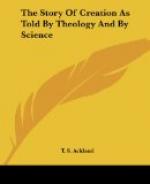Next, it is alleged that Moses describes the firmament as a solid vault.[Footnote: Essays and Reviews, p. 220.] “The work of the second day of creation is to erect the vault of heaven, which is represented as supporting an ocean of water above it.” That the Greek and Latin translations in this place do seem to imply the idea of solidity seems indisputable; and from the Latin the word “firmament” has passed into our own language. But there is no reason to think that the Hebrew word has any such meaning. It is derived from a root signifying “to beat out—to extend.” [Footnote: May not this root, [Hebrew script], have some connexion with [Hebrew script], “to be light,” from which is derived the Aramaic “Raca” of Matt. v. 22?] The verb is often applied to the beating out of metals, but not always. It is a new doctrine in etymology, that the meaning of a verbal noun is to be deduced from the nouns which often supply objects to its root, instead of from the meaning of the root itself. But even if it can be shown that the word did originally involve such a meaning, that would be nothing to the purpose. It would only be in the same case with a vast number of other words, which, though etymologically untrue, are habitually used without inconvenience, because they do convey to the minds of others the idea which we intend to convey, their etymology being lost sight of. Probably, the very persons who bring forward the objection do sometimes use the word “firmament,” though they know the error which is involved in it. Nor would they be any more accurate if they substituted for it the Saxon word “heaven,” since that also involves a scientific inaccuracy. The word used by Moses was the commonly recognized name for the object of which he was writing; and no objection to his use of it can be maintained, unless it can be shown that in using it he rejected some other word equally intelligible to all, and which was at the same time etymologically correct. But there is no ground for the assumption that any such word existed in the time of Moses or at any subsequent period.




